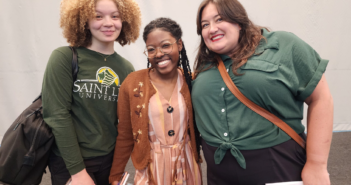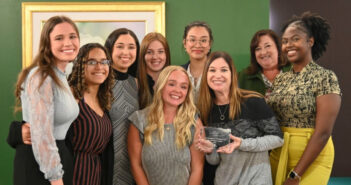Do you want a job, but don’t know where to start? Do you know what the requirements for some jobs are? Do you know the difference between work-study and non-work-study?
Federal Work Study (FWS) is a program implemented by the United States government that subsidizes paychecks for undergraduate and graduate students working part-time. Domestic students can qualify for work study by applying for Free Application for Federal Student Aid (FAFSA) and indicating on the application their interest in FWS. Also, FWS eligibility is reviewed each year and whether or not students receive it is determined by their FAFSA.
Although domestic students can apply for FAFSA and qualify for work study, this does not apply for international students.
“International students are not eligible to get FWS (Federal Work Study),” said Paige Ramsey-Hamacher, the executive director for Student Success. “This is because this is awarded by the US federal government to US citizens or permanent residents who have filled out the FAFSA form and have shown financial need. Not all US citizens get this award either.”
In fact, domestic students, who apply for FASFA, are granted FWS on a first come, first served basis until the allotted funding is exhausted. FWS is also granted based on financial need, and FWS is intended to help fund some of students’ educational expenses.
“Financial need is the difference between the cost of attendance (COA) at a school and the Expected Family Contribution (EFC). Need is reduced by the total amount of all scholarship and/or grants; if there is remaining need and there are remaining allocated funds, a student will be awarded,” said Nisa Harrelson, the financial aid technical advisor.
When awarded FWS, a student is given a certain amount for the semester and the student cannot earn more than the amount awarded. Also, FWS awards can decrease during the year due to extra funds awarded through grants or scholarship. This is why it is imperative that students are aware of the amount awarded.
According to the 2017-2018 Student Employment Handbook: “If a student is awarded Federal Work Study, it is that student’s responsibility to keep track of cumulative FWS earnings and to advise the supervisor monthly of the balance. Once the FWS limit for the semester is reached the department will terminate employment.”
FWS money is limited because the allocation from the federal government is a limited amount and the amount changes annually. There are common reasons why students are denied funding for FWS.
“The most common reason that a student is denied funding is due to (a) the allocation granted to the University has been exhausted and/or (b) the student has no financial need as determined by the Department of Education once the FAFSA has been completed,” said Harrelson.
Students who are awarded FWS would then apply for a FWS job on campus to earn the federally funded income. According to Melinda Clark, associate vice president of Financial Aid, everyone who is awarded FWS can get a job on campus, if each student is willing to work where the jobs are available.
“The most common positions for students on campus are positions in the Admissions, Athletics, Library, Newspaper and Student Services departments,” said Harrelson.
Sometimes, students may not want the jobs that are in certain departments. However, if students aren’t willing to work and they have been awarded FWS, it is important they report to the school that they decline the FWS money awarded.
“If a student is not interested in Federal Work Study, they should email student.employment@saintleo.edu as well as finaid@saintleo.edu to ask that Financial Aid remove the award and it will be awarded to a student on the waitlist,” said Harrelson.
Seeing that FWS is limited, it is important that if a student is no longer interested in using it, they should say so to ensure that another student can receive the award.
Although there are limited FWS opportunities, there are other opportunities for financial assistance. Those who are not eligible or don’t qualify for FWS at Saint Leo are still able to apply for another type of job, which is supported by school funds. These types of jobs are known as non-FWS jobs or Institutional Funded Employment, which is open to both domestic and international students.
In past years, there had been complaints among the student body about the limited number of jobs of available and that the number of FWS jobs heavily outweighs the non-FWS jobs. However, during the last academic year, 52 percent of the jobs on campus were FWS, and 48 percent were non-FWS, according to Clark.
“In 2016-2017, there were 290 federally funded positions and 263 institutionally funded positions,” said Clark.
And if this does not seem like enough jobs for the student population, there has been an increase in jobs on campus for this year.
“Federal allocation for work study has increased slightly year over year. Institutionally funded allocations have increased for the 2017-2018 academic year as well,” said Clark.
To get employment information to the students, a Student Employment Fair that was held on Aug. 21 in the Student Activities Building (SAB). This is the first time the event was held and it was hosted by Career Planning, and decision to hold followed a meeting with First Year Experience.
“The idea came about as a way to help students find employment on-campus, especially first year students who are new to Saint Leo University and not sure of the opportunities available to them,” said Deanna Bullard, the Assistant Director of Career Planning. “We also wanted to highlight Saint Leo’s awesome departments and offices and the positions they have available!”
The event had a great turnout. In fact, according to Bullard, Career Planning is planning to hold this event each semester from now on.
“The On-Campus Student Employment Fair was very successful. We had a lot of students come out and a good amount of representation from on-campus offices. In the future, we are hoping to expand on this great turnout even more,” said Bullard.
Departments that attended the employment fair encouraged students to apply online, which is the most common way for students to look for and apply for jobs on campus.
“All student employment jobs are posted online,” said Clark. “Students may utilize the normal student employment process to review the jobs available.”
Despite the fact that there is an increased number of jobs on campus, there are still not enough jobs to support the entire student population. However, there are other options available to students, for example, getting an off-campus job.
“If a student doesn’t secure a position on campus by either federal work study or non-federal work study positions, if they have transportation, they check local area businesses for possible positions,” said Harrelson.
So, there are numerous opportunities for students to be employed, whether it is through FWS, non-FWS, or off-campus jobs. However, international students are not allowed to work for off-campus jobs, except under certain circumstances.
“International students, in general, are restricted by their F1 student visa to work in on-campus jobs only,” said Ramsey-Hamacher. “But for the most part, international students, regardless of how long they are in the present in the United States on an F1 visa, are not entitled to work off campus unless they are applying for special work authorization such as severe economic hardship; CPT or OPT.”
International students also have opportunities to work for internships as well.
“After one full academic year on-status, students can do internships (CPT – curricular practical training) which allows the student to work off campus for an internship provided they are registered in an internship class and this internship is approved by their academic advisor and then added to the I-20 by the MISO (Multicultural and International Services office) ,” said Ramsey-Hamacher. “This is authorized on the students I-20 for the term in which the student is enrolled in the internship class.”
Internships are great opportunities to get more experience in a field, but also paid internships are great for financial help for both international and domestic students.
Also, there are other opportunities for financial assistance through financial aid and from scholarships. Despite many student’s perceptions that the school has very few scholarships available, the number of scholarships offered has actually increased over the years.
“I’d like to clear up any misperception that Saint Leo University is offering fewer scholarships. Three years ago, we offered 150 privately funded scholarships, and now, thanks to many generous donors we offer 350,” said Denny Moller, vice president of University Advancement and Communications. “The number of available scholarships fluctuate year-to-year, because if a student is awarded a renewable scholarship as a freshman and keeps up their grades, that scholarship is not available to another student for the next three years.”
Also, Saint Leo offers help by awarding students financial aid to help ease the burden of tuition for students.
“Additionally, we offer institutional aid in the form of merit (such academic and athletic scholarships) and need-based awards. Saint Leo University is quite generous in comparison to other schools with similar profiles nationally,” said Moller.
Overall, there are numerous avenues for financial assistance, including FWS jobs, non-FWS jobs, off-campus jobs, paid internships, scholarships, and grants. Students can take advantage of these opportunities, whether it is to help with paying for tuition, a savings pool, or spending funds.





